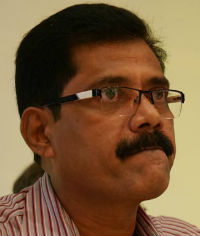Reeds 34 mensen opgepakt in heksenjacht tegen vakbonden
Sinds in december stakingen uitbraken in 20 Bengaalse kledingfabrieken, worden bijna dagelijks mensen willekeurig opgepakt. Afgelopen weekend werden alweer 9 vakbondsleiders gearresteerd in Bangladesh. Vandaag staat de teller op 34. Er werd ook klacht ingediend tegen minstens 700 werknemers en vakbondsleiders. Vakbonden en ngo’s eisen dat de Bengaalse autoriteiten iedereen die opgesloten zit vrijlaat en de politiek gemotiveerde aanklachten laat vallen. De internationale kledingmerken die in Bangladesh produceren moeten de overheid en de werkgevers onder druk zetten om de rechten van werknemers te respecteren.
In december brak een spontane staking uit in de kledingfabriek Windy Apparels in Ashulia, een wijk in Dhaka, de hoofdstad van Bangladesh. De staking en de protesten deinden uit naar andere kledingfabrieken in de regio. Vele daarvan maken kleding voor bekende Westerse merken (H&M, Zara, Gap, Primark,...). In plaats van loonopslag, kregen meer dan 1600 werknemers hun ontslagbrief. Ze worden beschuldigd van vandalisme, plundering, bedreiging van medearbeiders en het aanvallen van fabriekskaders. Intussen werden al 34 vakbondsleiders en –activisten gearresteerd, terwijl de overgrote meerderheid niet eens betrokken was bij de stakingen.
De stakers eisten een hoger minimumloon, tussen de 15.000 en 16.000 taka (179-190 euro) per maand. Met het huidige minimumloon van 5.300 taka (63 euro), dat al dateert van 2013, moeten ze huur, vervoer, gezondheidszorg en eten betalen. De huur van een kamer kost echter al 2500 tot 4500 taka per maand. Zowel de Bengaalse regering als de werkgeversfederatie BGMEA weigeren een loonstijging. “Het totale gebrek aan vakbondsvrijheid is het grootste struikelblok voor een veilige en duurzame kledingproductie in Bangladesh,” zegt Sara Ceustermans van de Schone Kleren Campagne. “Werknemers kunnen nog steeds geen loonsverhoging vragen zonder gearresteerd of ontslagen te worden, terwijl net sterke vakbonden de enige écht duurzame garantie zijn op betere arbeidsomstandigheden voor de Bengaalse kledingarbeiders.”
Reactie kledingmerken ondermaats
De reactie van de kledingmerken met productie in Bangladesh was tot nu toe ondermaats. Op 4 januari verstuurden 21 internationale merken een brief naar de Bengaalse overheid over de onlusten in Ashulia, maar die brief werd niet publiek gemaakt. Sindsdien bleef het oorverdovend stil. Ook de Europese Commissie ging nog niet tot actie over. Bangladesh valt onder een gunstig handelssysteem[1] met de EU, waardoor het taxvrije toegang heeft tot de Europese markt. Ter vergelijking: kledingbedrijven die kleding laten produceren in China betalen hierop een importtax van 12%. Aan dat gunstige handelssysteem zijn wel een aantal voorwaarden verbonden, zoals het respecteren van de fundamentele arbeids- en mensenrechten. Vakbonden en ngo’s roepen de Europese Commissie op om deze hefboom te gebruiken en een onderzoek in te stellen naar de schendingen van de vakbondsvrijheid. Voorlopig lijkt de Europese Commissie daar niet toe bereid. De Bengaalse regering kan dus ongestraft de opgelegde voorwaarden blijven schenden.
De les van Rana Plaza
De slechte werkomstandigheden in de Bengaalse kledingsector hebben herhaaldelijk geleid tot rampen. De dodelijkste was de instorting van Rana Plaza op 24 april 2013. 1.138 kledingarbeiders stierven, meer dan 2.000 anderen raakten gewond. Op 13 mei 2013 werd het bindende Akkoord over brand- en gebouwveiligheid afgesloten. Dat akkoord loopt tot 2018 en werd inmiddels door meer dan 200 internationale merken ondertekend. Andere problemen, zoals de extreem lage lonen en het gebrek aan vakbondsvrijheid, worden er niet mee aangepakt.
De Schone Kleren Campagne is een coalitie van verschillende organisaties: ABVV, ACV, Wereldsolidariteit, FOS, BBTK, LBC, ACV-Metea, ABVV AC, Testaankoop en Netwerk Bewust Verbruiken. De Schone Kleren Campagne maakt deel uit van het internationale netwerk Clean Clothes Campaign, met 17 coalities in Europa en meer dan 200 partners wereldwijd.
Meer info: Sara Ceustermans, coördinatrice Schone Kleren Campagne









